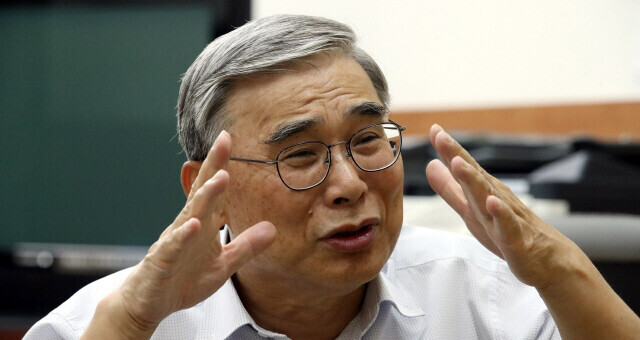hankyoreh
Links to other country sites 다른 나라 사이트 링크
N. Korea expert says WPK turned into “Kim Jong-un party” with amendment in party rules

Former Minister of Unification Lee Jong-seok, South Korea’s top authority on research into the Workers’ Party of Korea (WPK) said an amendment of the party’s rules at its 8th Congress last January included “important changes that signified its complete transformation into the ‘Kim Jong-un party’” in all areas of politics, South Korea relations, governing, and the economy.
Speaking via videoconference with the members of the Ministry of Unification press corps Wednesday, Lee said, “The ‘Kim Jong-un party’ reached completion through the latest amendment to the party rules.”
In particular, he cited important changes in key areas, including the source of leadership (from Kim Il-sung and Kim Jong-ilism to Kim Jong-un himself), political methods (from military first policies to a paramount emphasis on the people), South Korea strategy (from advocating revolution in the South to advocating revolution in North Korea only), unification discourse (from supremacy of the Korean people to supremacy of North Korea), and economic management (from an alternative program system to a “socialist corporate responsible management system,” as reflected in an April 2019 amendment in the North Korean Constitution).
Lee summarized the major changes in the new rules adopted at the 8th WPK Congress in terms of four main aspects.
The first was a decline in discourse advocating revolution in the South and reunification. Lee explained, “The deletion of the reference to ‘a democratic revolution to liberate the people’ in the introduction to the party rules is more than just a change in wording. It signifies an end to the South Korean debate over whether North Korea might change its strategy toward the South.”
He also said the amendment “means an intensification of ‘North Korea-centric’ tendencies, echoing the ‘supremacy of North Korea’ discourse that emphasizes the nationhood of socialist North Korea.”
The second change was the end of military first (Songun) politics and the proclamation of a paramount emphasis on the North Korean people as a new political approach.
“The ‘people first’ politics adopted as a basic approach to socialist politics following the deletion of ‘military first’ politics in the new party rules serves as a basis for a course that focuses all capabilities on building the economy,” Lee said.
A third change was the creation of the new position of WPK Central Committee first secretary as an institutional measure to ensure the stability of the leadership system.
Lee explained that this was a “measure to ensure stability in the leadership system in anticipation of an emergency situation related to the supreme leader’s health or something similar.”
“The concept of a ‘representative’ here appears to be about including a figure who links between successors,” he said.
“Given the nature of the North Korean regime, the position of representative of the leader could only really be held by someone from the Paektu bloodline [a direct descendant of Kim Il-sung],” he noted, predicting a “possibility that [Kim Jong-un’s sister] Kim Yo-jong will be appointed as first secretary.”
A fourth change was the culmination of the WPK’s transformation into the “Kim Jong-un party” and a “partial return to status as an authentically Marxist party.”
“The new rules weaken the binding force of Kim Il-sung and Kim Jong-ilism, substituting ‘construction of a communist society’ for ‘realizing Kim Il-sung and Kim Jong-ilism across society’ as the WPK’s ultimate goal,” Lee added.
He went on to suggest that the new WPK rules’ omission of previous wording about “crushing Japanese militarist machinations for renewed invasion” might “function as a positive signal in North Korea-Japan relations.”
By Lee Je-hun, senior staff writer
Please direct comments or questions to [english@hani.co.kr]

Editorial・opinion
![[Guest essay] The real reason Korea’s new right wants to dub Rhee a founding father [Guest essay] The real reason Korea’s new right wants to dub Rhee a founding father](https://flexible.img.hani.co.kr/flexible/normal/500/300/imgdb/original/2024/0423/8317138574257878.jpg) [Guest essay] The real reason Korea’s new right wants to dub Rhee a founding father
[Guest essay] The real reason Korea’s new right wants to dub Rhee a founding father![[Column] ‘Choson’: Is it time we start referring to N. Korea in its own terms? [Column] ‘Choson’: Is it time we start referring to N. Korea in its own terms?](https://flexible.img.hani.co.kr/flexible/normal/500/300/imgdb/original/2024/0423/3617138579390322.jpg) [Column] ‘Choson’: Is it time we start referring to N. Korea in its own terms?
[Column] ‘Choson’: Is it time we start referring to N. Korea in its own terms?- [Editorial] Japan’s rewriting of history with Korea has gone too far
- [Column] The president’s questionable capacity for dialogue
- [Column] Are chaebol firms just pizza pies for families to divvy up as they please?
- [Column] Has Korea, too, crossed the Rubicon on China?
- [Correspondent’s column] In Japan’s alliance with US, echoes of its past alliances with UK
- [Editorial] Does Yoon think the Korean public is wrong?
- [Editorial] As it bolsters its alliance with US, Japan must be accountable for past
- [Guest essay] Amending the Constitution is Yoon’s key to leaving office in public’s good graces
Most viewed articles
- 1[Column] ‘Choson’: Is it time we start referring to N. Korea in its own terms?
- 2Why Korea shouldn’t welcome Japan’s newly beefed up defense cooperation with US
- 3Senior doctors cut hours, prepare to resign as government refuses to scrap medical reform plan
- 4[Guest essay] The real reason Korea’s new right wants to dub Rhee a founding father
- 5Samsung barricades office as unionized workers strike for better conditions
- 6Opposition calls Yoon’s chief of staff appointment a ‘slap in the face’
- 7[Column] The clock is ticking for Korea’s first lady
- 8[Editorial] Japan’s rewriting of history with Korea has gone too far
- 9New AI-based translation tools make their way into everyday life in Korea
- 10Terry Anderson, AP reporter who informed world of massacre in Gwangju, dies at 76